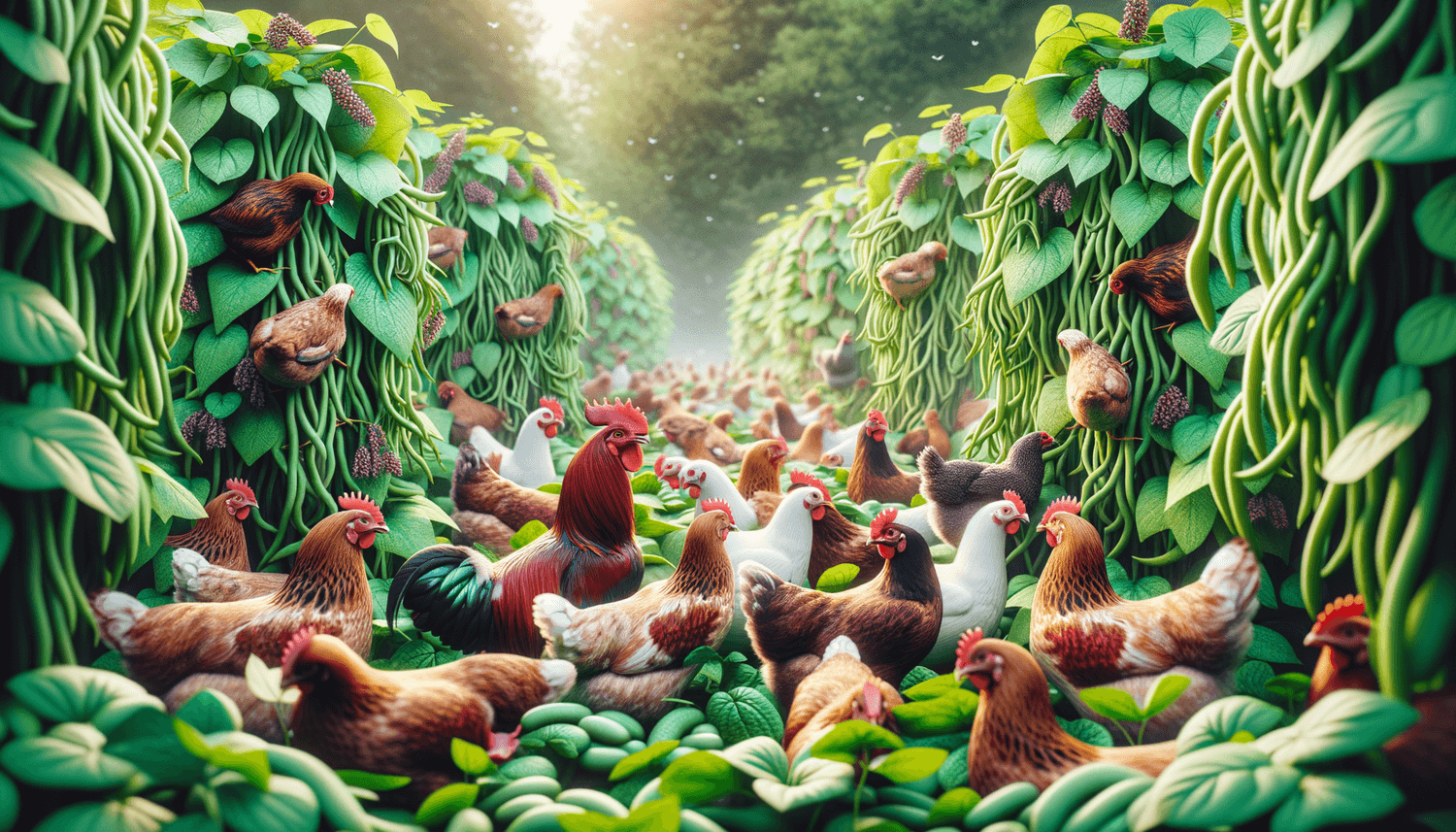Welcome back to our clucking awesome blog! Today, we’re pecking away at a question that has been stirring up some serious backyard chatter: “Can chickens eat bean plants?” This might seem like small potatoes (or should we say chickpeas?) but when it comes to our feathered friends, it’s important to make sure their diet is balanced and nutritious. So, let’s take a deep dive into the world of chickens and bean plants, exploring the benefits, risks, nutritional pluses, and even some tips on how to serve up these leafy greens in a way that will get your flock clucking in excitement!
Can chickens eat bean plants?
Yes, chickens can eat bean plants, but with some precautions. Raw bean plants, particularly those containing uncooked beans, can pose safety risks due to phytohaemagglutinin, a natural toxin. However, when cooked thoroughly, this toxin is neutralized, making the beans and plants safe for your chickens to consume.
Finding balance in a chicken’s diet
Just like humans, chickens need a balanced diet to thrive and stay healthy. Imagine if we survived on just one type of food every day – how boring and unhealthy would that be? The same goes for our feathered friends, and it’s important to remember that not all sources of nutrition are created equal. A chicken’s diet should primarily consist of high-quality chicken feed, which provides the necessary nutrients they need to stay strong and productive.
Chicken feed should make up around 80-90% of their overall diet, ensuring that they receive the right amounts of protein, vitamins, and minerals. However, that doesn’t mean you can’t spice things up and give them some tasty treats! The remaining 10-20% of their diet can comprise of supplemental goodies like fruits and vegetables, which not only add variety but also bring additional nutrients to the mix. Just remember to always prioritize high-quality chicken feed and keep treats to a moderate level to maintain the perfect balance for your happy, healthy flock.
Nutritional value of bean plants for chickens.
When prepared correctly, bean plants can offer some nutritional value to chickens. Beans are packed with important vitamins, minerals, and proteins that can complement their diet. For instance, they contain B vitamins such as thiamine, riboflavin, niacin, and folate, which help support various bodily functions, ranging from metabolism to the nervous system. Additionally, beans offer essential minerals like iron, magnesium, phosphorus, and potassium that contribute to a chicken’s overall well-being.
Apart from vitamins and minerals, beans are also a good source of fiber, which supports healthy digestion in chickens. Moreover, they contain antioxidants that boost their immune system, helping them fend off potential illnesses. And while bean plants themselves might not be the top choice for hydration, the water content in cooked beans does contribute somewhat to a chicken’s water intake.
Although bean plants offer several nutritional benefits, it’s critical to remember that they need to be cooked thoroughly before serving them to your flock. Uncooked beans and bean plants contain phytohaemagglutinin, which can be harmful to chickens. However, once cooked and toxin-free, bean plants can be a nutritious and flavorful treat for your chickens to enjoy in moderation.
Nutrition table of bean plants for chickens.
| Information | Description |
|---|---|
| Nutritional Value | Beans contain vitamins (B1, B2, B3, and B9), minerals (iron, magnesium, phosphorus, potassium), protein, and antioxidants. |
| Suggested Serving Size | Small portions of cooked beans or bean plants, ensuring they don’t exceed 10-20% of the chicken’s total diet. |
| Safe Feeding Practices | Only serve cooked beans or bean plants to neutralize the phytohaemagglutinin toxin found in raw beans. |
| Preparation | Thoroughly cook the beans and bean plants before feeding to chickens. |
| Potential Risks | Uncooked beans and bean plants can contain harmful levels of phytohaemagglutinin, causing toxic effects in chickens. |
| Hydration | Cooked beans have a water content that contributes to a chicken’s hydration. |
| Digestion | Beans are a good source of fiber, supporting healthy digestion in chickens. |
| Seasonal Availability | Bean plants are typically available during the summer and early fall months. |
| Other Benefits | Antioxidants in beans can help boost a chicken’s immune system, protecting against illness. |
Introducing beans to your chickens’ diet
Starting slowly when introducing beans or bean plants into your chickens’ diet is essential. Monitor your chickens for any signs of discomfort or digestive issues as they begin to consume cooked beans. Adjust portion sizes based on how well they tolerate the new treat, always ensuring it remains a small portion of their overall diet.
A bean buffet: Mixing it up with variety
While incorporating beans into your chickens’ diet can be a nutritious choice, adding a variety of fruits and vegetables keeps their snacking exciting and balanced. Some poultry favorites include leafy greens, apples, berries, grapes, and even small amounts of cooked pumpkin. Mixing different treats helps provide various nutrients and allows you to assess which ones your chickens enjoy the most!
Bean-safe storage
Storing bean plants properly is crucial to maintain their freshness and nutrition. Keep whole, uncooked beans in a cool, dry, and dark place within an airtight container. For cooked beans, store them in the refrigerator for up to a week. Make sure to dispose of bean plants with any signs of mold or spoilage to keep your chickens safe and healthy.
There you have it! With the right preparations and careful attention to diet balance, bean plants can be a delightful and nutritious treat for your backyard chickens. Cooked bean plants offer a healthy dose of vitamins, minerals, hydration, and dietary fiber, and can even support immune function. Remember, moderation is key, so mix up their treats while offering a predominantly high-quality chicken feed diet for the optimal health of your feathered flock.

















